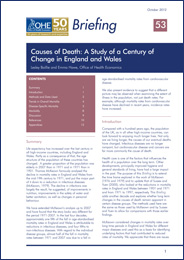OHE’s health and health care statistics service long has been respected as a source of reliable data. In an OHE Briefing just published, OHE uses this…
OHE’s health and health care statistics service long has been respected as a source of reliable data. In an OHE Briefing just published, OHE uses this data to take a closer look at what has been responsible for changes in the causes of death in England and Wales.
OHE’s health and health care statistics service long has been respected as a source of reliable data. In an OHE Briefing just published, OHE uses this data to take a closer look at what has been responsible for changes in the causes of death in England and Wales.
We are living longer. In his well-known research, Thomas McKeown found that life expectancy in England and Wales increased by around 30 years between 1901 and 1971. He attributed that primarily to a reduction in deaths from infectious diseases, the result of improvements in nutrition, safer water and better sanitation, and changes in personal behaviour.
This new OHE Briefing, which extends McKeown’s analysis to 2007, finds that mortality continued to decline after 1971. It tells a different story, however, about changes in the causes of death. Between 1971 and 2007, only about 20% of the reduction in age-standardised mortality rates in England and Wales is attributable to reductions in infectious diseases. This in part is because some illnesses have all but disappeared—for example, cholera, diarrhoea, dysentery and respiratory tuberculosis[1]. But it is due mainly to marked declines in deaths from other causes.
It is striking that almost 20% of the decline in mortality during 1971-2007 is the result of lower age-standardised mortality rates for just one cause of death—cardiovascular disease. This is despite an increase in incidence rates for that disease. Innovation in health care has been important; for example, the first beta blocker was marketed in the UK in 1965, offering the first truly effective medical treatment for the disease. The authors note, however, that other factors that also have had an important effect, including lifestyle changes.
The OHE Briefing highlights some diseases for which age-standardised mortality rates in recent years have risen. For example, between 1997 and 2007, mortality rates increased for diseases of the digestive system, including fibrosis and cirrhosis of the liver. According to the authors, “This may indicate that whereas, in the past, changes in sanitation and other public factors outweighed effects from personal behaviours, in the current day negative personal behaviours can increase the risk for both morbidity and mortality from certain diseases (e.g. obesity and diabetes)”.
At the same time that life expectancy has increased, so has the number of individuals living with chronic disease. Not surprisingly, the percentage of the population reporting chronic ill health has increased the most for those aged 65 and over—from 53% in 1972 to 63% in 2007.
Both declines in mortality and increases in morbidity will have important implications for health and health care for many decades to come.
Download Baillie, L. and Hawe, E. (2012) Causes of death: A study of a century of changes in England and Wales. 53. OHE Briefing. London: Office of Health Economics.
